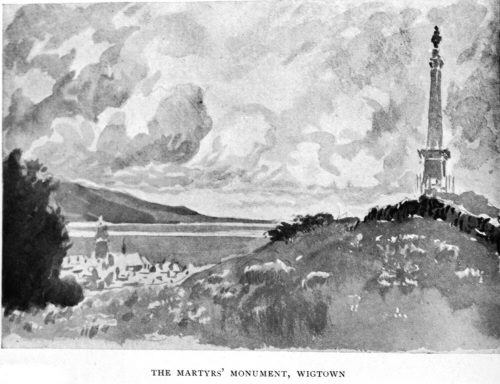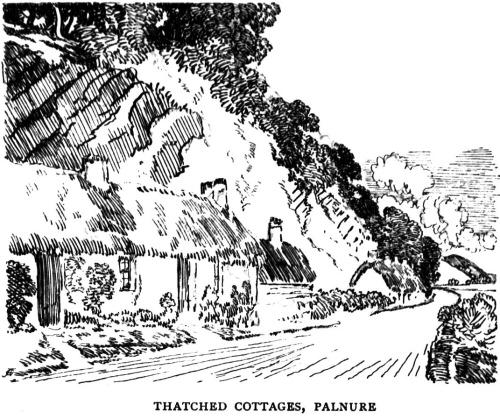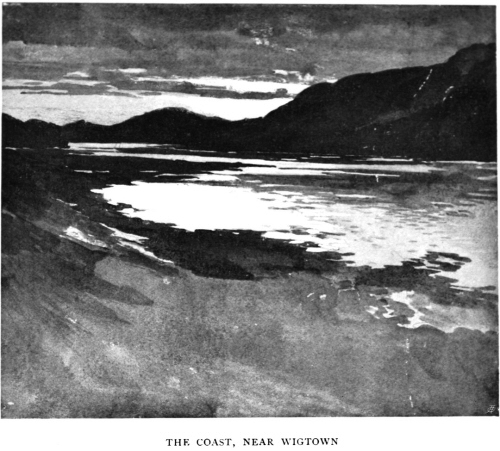|


TWO LAKELANDS GALLOWAY AND
CUMBERLAND
ONCE on a glorious first of October the snow was lying
thick on the stooks as I went down into St. John's Vale and looked upon
Derwentwater. Hardly a cornfield was cleared, and the blonde grain upon the
tops of the sheaves looked up through the snow with an unaccustomed and
pathetic chill.
Now in the last days of November, the primroses are in bloom
under the home of the dead Master at Coniston. It may be that it has been
chiefly my fortune to visit the Lakes in autumn, but to me the season seems
to fit the country better than any other.
Yet those who live there all the year tell me that it is
like the sun on the hills of Beulah, when in spring the blue hyacinth haze
lies like peat reek in every hollow. But in spring I want to be farther from
the snell breath of my own east wind; and in summer-well, there are few
places on earth that can woo me from Galloway in summer.
"Autumn is Scotch and
lingers lovingly among the hills.”
So says the author of "Olrig Grange," that gracious
poetpreacher. But, after all, Cumbria is also Strathclyde, and save for the
fight on Dunmail Rise we might have made one compact kingdom of it from
Clyde to Mersey, and been a thorn in the sides of those intruding Saxons to
which the Irish one were but as the tickling of a thistledown.
Derwentwater I shall ever remember. It was, I think, in
1889, and on the first day of October in that year, that I saw the
splendours of full autumn shine from under the veil of white like an arrayed
bride on her way to the altar. The long smooth slopes of Helvellyn were
smoother than ever-sleeked and polished with glistering snow. The nearer
ridges, Walla and the Castle Crag, stood black against the pure new-fallen
drift .
But most of all I shall not forget the Vale of St. John on
that first of October, and the snow lying heaped and chill among the
sheaves–the tall stooks blonde like meadow-sweet, growing through frozen
wreaths. Of course, even in a day the snow melted from off the corn, and the
fanners of the vale led in the grain no whit the worse. The October sun was
hot, and the shores of Derwentwater flamed into sudden crimson and gold,
like the sunset of a stormy day.
Yet nevertheless Lakeland is “no my ain hoose–I ken by the
biggin' o't.” But it is a fine" hoose" for all that, and there is happiness
to me in sojourning in it. My land is Galloway, and that I love best, even
as I love mine own Sweetheart better than another's sweetheart. Once I said
that Galloway was like a plain maid with beautiful eyes

and not so very plain either when I come to think of it–but
with eyes that are frankly blue and outlooking. For she smiles up at us from
her thousand lakes and tams, which reflect the sky and the clouds, and make
beautiful her most desolate scene.
The Lakes of Lakeland.
The lakes of Lakeland are fewer, larger-more intentional,
as it were, on Nature's part. But in Galloway, whenever you conquer a
mountain summit, there is every chance that you will find a “Dhu Loch" lying
a few steps beneath you, with chance flaws from the clouds of the hill face
playing upon it. A typical Galloway loch is Loch Valley, which flashes upon
the traveller like the transformation scene of a picture as he mounts one of
the little hillocks of " jingling stones "–the Loch Valley "terminal
moraine," about which geologists have so much to say. How far it appears to
reach from east to west, running beneath the rocky Jarkness from horizon to
horizon, the wild treeless slopes of the ancient Forest of Buchan closing it
in ! Above it there is only the desolation of the older land towards Enoch
and the stars. And may all the gods of solitude defend the passes, that the
rail come no nearer to birch-fringed Trool and the white water of Gairland,
where it leaps down its lonely steep and hastens to the loch between grassy
banks, under which the shy trout sulk and upon which the bog-myrtle grows.
Yet it was gladsome, too, when, from a "little-lit toureIle"
built like a swallow's nest on the side of a beautiful house, I looked my
first upon Coniston Lake and saw the white dwellings of men sprinkled
liberally on the opposite side of the water. I saw the reek of the morning
meal going up from them, and a burst of steam told me of the locality of the
station, where in the blackness of the night I had arrived. Then I allowed
within me that Coniston, with her "Old Man" smoking his morning pipe and
looking down on the lake, was among the world's choicest of pleasant places.
.
The scene as I saw it then was arranged to take the unwary
by surprise. It was that hour of dawn which all my life I have most loved.
As I laid a finger upon the cord, of its own accord the blind sprang
upwards, and lo! there below me were the shining levels of the lake and the
dawn red behind the hills to the east. An equal wind, chill but not dank,
was blowing, and the white houses of Coniston village looked right friendly
at me across the bay. A good land, even though not mine own! |

